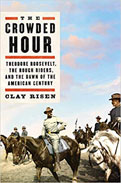
 |
The Crowded Hour: Theodore Roosevelt, The Rough Riders, and the Dawn of the American Century
by Clay Risen
Scribner
At the turn of the twentieth century, before America entered Europe to join the WWI campaign, the US was an isolationist country healing from the great war of the previous generation when its north and south did all but completely tear the union asunder. It had pushed to the California coast, claiming the nomadic plains from Native American tribes as well as Mexico’s Spanish legacy. The scars of battle were fading, but the mythology of the Wild West was taking hold. Both a romanticism and dread of the past competed in the American psyche, as it headed into a bold and fearsome future.
Meanwhile, the long reach of Spain, one of the last European empires, loosened if not entirely retracted. It’s holdings across the globe were no longer strictly under its control, and where Spain could, it kept the people in line through colonial brutality at the tip of a bayonet. Cuban was one such place, blown-up and divided via a series of indigenous revolts spread over more than one hundred years. For Cuba, independence was at stake. For Spain, the loss of its final new world foothold, including significant financial benefits, hung in the balance. Eventually, the sinking of the USS Maine in Havana, which may have been a military accident and not Spanish aggression, mobilized the US to Cuba’s side, thus beginning America’s longstanding policy of global intervention for freedom.
There exists periods in history when a man is born for the times. Theodore Roosevelt was one such man. Revered by many for his frontier exploits and often reviled by those in higher offices, Teddy Roosevelt had the capacity to charm, repel, lead, and recoil men. While benefiting from a privileged upbringing, stoic might be a primary word to describe him, but he wasn’t a quiet man. He lauded the selfless deeds of others, while booming his dissatisfaction with the military’s general lack of preparedness. As an assistant to the Secretary of the Navy, he pushed for an increase in naval forces. While many in power lingered in the terrible memories of the Civil War, Roosevelt asserted that weakness in fact attracted outside aggression. After the Maine and against recommendation, he resigned his post to assemble a special force for the looming engagement with Spain.
This is the evolution of Roosevelt’s famous Rough Riders, a throwback cavalry ranging from greenhorns to seasoned adventurers, war veterans, and frelance cowboys who volunteered on horseback to avenge the Maine. In fact, they were the country’s first volunteer cavalry. Every bit of the American spirit and experience seemed to assemble outside San Antonio, and at first blush, Roosevelt wondered if they’d ever get this regiment of around one thousand men into working order. They were lean and rugged, and many barely operated with a sense of discipline. Order had to be maintained, even while rules were bent to accommodate those who’d spent a lifetime demonstrating the essence of liberty and independence on the frontier.
While the entire campaign is outlined in this book, the turning point, as well as one of Roosevelt’s personal high water marks, is superbly detailed during the Battle of San Juan Hill. In breadth, length, and barbarity, the battle fails in measure against any involving US troops before or after, yet it remains iconic in American history. Perhaps this was because the troops themselves were somewhat iconic even before they set sail from the Florida coast. For months, Roosevelt feared that the conflict might conclude before they reached Cuba, and although his troops eventually did land and see action, when the famous moment arrived along a rise known as Kettle Hill, he rushed forward with his charge almost out of a sense of overall frustration as much as his concern to protect his men. For the most part, the battle was paced and labored, gathering many casualties, not the storming uphill gallop depicted in art and lore.
In The Crowded Hour, eponymously named from Roosevelt’s battle description at San Juan Hill, journalist and author Clay Risen narrates a pivotal moment when the US rejoined in the aftermath of the Civil War and western expansionism and turned outward to launch its mandate of spreading democracy around the world, or at least pause the succession of imperial, dictatorial, or socialist growth. As is always the case, motivations are never pure, and Risen does well to identify both the genesis of our actions and the naivety of the times. He also dedicates significant pages to establishing the assembly of the troops and the attitudes surrounding them and those of their peers and countrymen. In many ways, these noncombat aspects are more important than following a roughly two-month “war” in the Caribbean. In the end, a maturing country had finally chased the last vestiges of the old world from the new world, while beginning a global policy that exists until this day.
RECOMMENDED by the US Review
Next Focus Review
Previous Focus Review